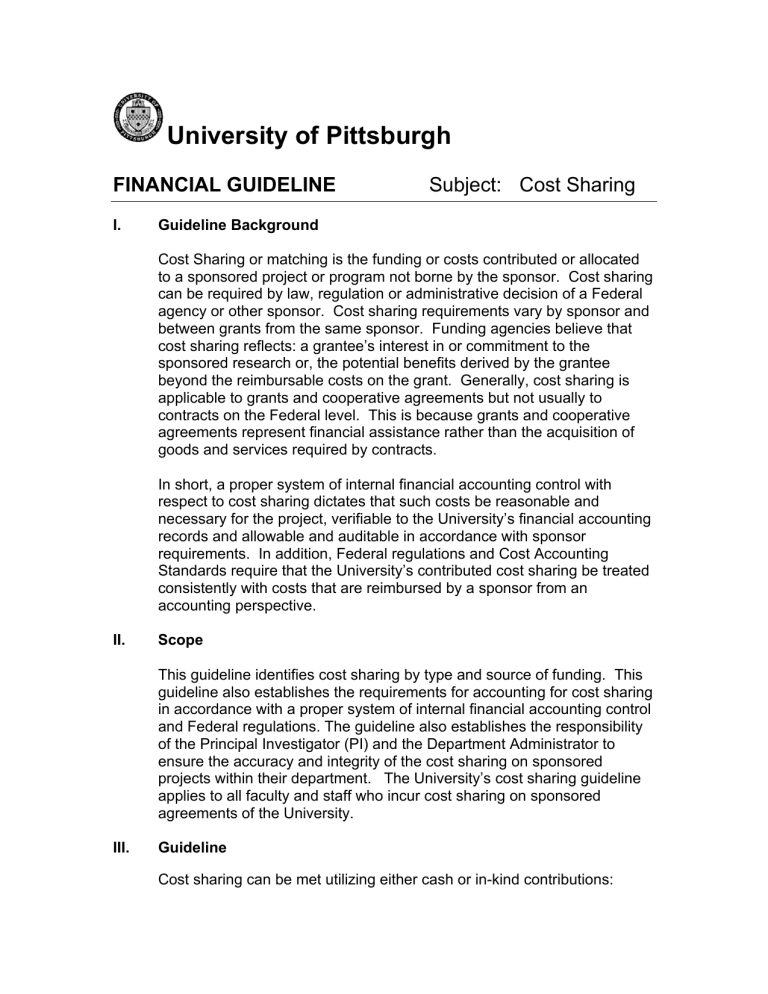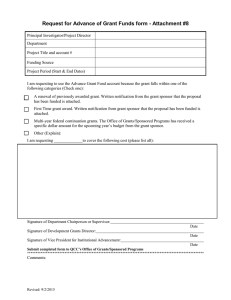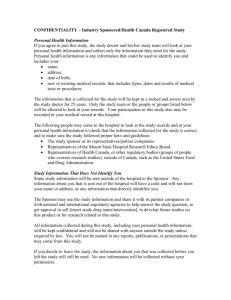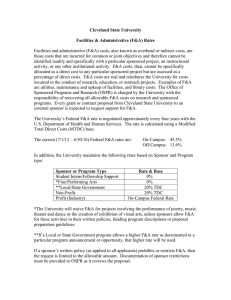University of Pittsburgh FINANCIAL GUIDELINE Subject: Cost

University of Pittsburgh
FINANCIAL GUIDELINE Sharing
I. Guideline
Cost Sharing or matching is the funding or costs contributed or allocated to a sponsored project or program not borne by the sponsor. Cost sharing can be required by law, regulation or administrative decision of a Federal agency or other sponsor. Cost sharing requirements vary by sponsor and between grants from the same sponsor. Funding agencies believe that cost sharing reflects: a grantee’s interest in or commitment to the sponsored research or, the potential benefits derived by the grantee beyond the reimbursable costs on the grant. Generally, cost sharing is applicable to grants and cooperative agreements but not usually to contracts on the Federal level. This is because grants and cooperative agreements represent financial assistance rather than the acquisition of goods and services required by contracts.
In short, a proper system of internal financial accounting control with respect to cost sharing dictates that such costs be reasonable and necessary for the project, verifiable to the University’s financial accounting records and allowable and auditable in accordance with sponsor requirements. In addition, Federal regulations and Cost Accounting
Standards require that the University’s contributed cost sharing be treated consistently with costs that are reimbursed by a sponsor from an accounting perspective.
II. Scope
This guideline identifies cost sharing by type and source of funding. This guideline also establishes the requirements for accounting for cost sharing in accordance with a proper system of internal financial accounting control and Federal regulations. The guideline also establishes the responsibility of the Principal Investigator (PI) and the Department Administrator to ensure the accuracy and integrity of the cost sharing on sponsored projects within their department. The University’s cost sharing guideline applies to all faculty and staff who incur cost sharing on sponsored agreements of the University.
III. Guideline
Cost sharing can be met utilizing either cash or in-kind contributions:
University of Pittsburgh
FINANCIAL GUIDELINE Sharing
Cash Contributions
• salaries (usually of faculty members)
• associated employee benefits
• supplies
• equipment
• subcontract costs
• indirect costs applicable to the cost shared costs
• indirect cost rate differential
• GSR rate differential
In-Kind Contributions
• volunteer employee services
• volunteer professional, technical or consulting services
• donated supplies
• donated equipment, property or space
Cost sharing can be funded utilizing multiple funding sources including:
• funds contributed from unrestricted institutional funds
• funds contributed from restricted institutional funds
• RDF/TRM University funds
• non-Federal third-party sponsors
The following expenses cannot be used as cost sharing on a Federal award in accordance with OMB Circular A-21 and other agency criteria:
• Expressly unallowable costs identified by OMB Circular A-21 Section J. or identified by the sponsor in the sponsored agreement
• Administrative and clerical salaries or any other costs properly classified as indirect costs in accordance with A-21 F. 6. b.
• Indirect costs in excess of the 26% administrative rate cap (A-21 G. 8.)
• Salary dollars in excess of the NIH rate cap (NIH Grants Policy
Statement)
• Construction or renovation costs, except those required by contract, as these costs are typically recovered as Facilities and Administrative costs (A-21 F.) and can result in disputes of ownership and disposal of the assets involved.
University of Pittsburgh
FINANCIAL GUIDELINE Sharing
(con’t)
There are three types of cost sharing:
• Mandatory
• Voluntary - Committed
• Voluntary - Uncommitted
Mandatory cost sharing is cost sharing that is required by written agreement or regulation by the sponsor. Mandatory cost sharing must be documented by project by the University.
Voluntary - Committed cost sharing is cost sharing that is proposed by the
University, and when accepted and included in the terms of the award by the sponsor, becomes mandatory and must be documented by project.
Voluntary – Uncommitted cost sharing is not proposed by the University and not formally accepted and included in the terms of the award by the sponsor, but is “voluntarily” incurred by the University. Voluntary cost sharing need not be documented.
All individuals who are required to incur cost sharing on sponsored projects of the University must ensure that:
• cost sharing be identified, documented and verifiable to the Institution’s formal or informal accounting records and auditable by the sponsor
• the cost sharing “commitment” is documented by department by project for accounting and reporting purposes. (Cost sharing need not be specifically tracked by transaction in the formal financial system.)
• cost sharing be identifiable by project and be incurred during the period of performance of the related project
• cost sharing be reasonable and necessary for the completion of the project
• cost sharing consist of allowable costs in accordance with OMB
Circular A-21
• cost sharing be provided from University funding or other non-Federal funding sources
• cost sharing be provided for in the approved budget when required by the sponsor
University of Pittsburgh
FINANCIAL GUIDELINE Sharing
(con’t)
• cost sharing not include the indirect cost differential (the difference between sponsor approved and University negotiated rates or
University negotiated rates and University calculated rates) unless approved by the Federal awarding agency
• the valuation for cost sharing of in-kind contributions and services be performed in accordance with the applicable Federal regulation
• cost sharing is generally applied to grants and cooperative agreements but usually not contracts on the Federal level
• cost sharing be provided only when it is required and only to the percentage or amount specified under the terms of the grant, contract or agreement. (Voluntary cost sharing is discouraged except when necessary due to the competitive nature of the award.)
It is the University’s policy that cost sharing is borne by the school or department receiving the sponsored project. Accordingly, although cost sharing of the indirect cost rate differential is encouraged where possible, waiving of University negotiated indirect rates and associated costs to meet cost sharing requirements is not allowed. Indirect costs represent actual costs to the University as a whole in support of its three-fold mission of instruction, research, and public service. Cost sharing or waiving indirect costs represented by the rate approved by the sponsor is a cost of research to the University and not to the department. It also prevents the University’s recovery of its indirect costs if a sponsor does not pay for all or part of their allocable share of these costs.
The PI should coordinate with the Dean of the School or Department Chair to ensure that adequate cost sharing funds are available prior to proposal submission. In the event that cost sharing requirements previously agreed to cannot be met, the PI must contact the Dean or Department Chair, the
Office of Research and the awarding agency or sponsor to negotiate a settlement of the cost sharing obligation.
Consequences of noncompliance with cost sharing requirements can result in the reduction or elimination of the sponsor’s funding, resulting in increased costs to the University. Proper identification and documentation of cost sharing facilitates the accounting for sponsored projects and the preparation of the University’s indirect cost rate.
University of Pittsburgh
FINANCIAL GUIDELINE Sharing
IV. Definitions
Cost Sharing – The funding contributed or allocated to a sponsored project or program not borne by the sponsor.
• Mandatory cost sharing - required by written agreement or regulation by the sponsor.
• Voluntary - Committed cost sharing - proposed by the University, and when accepted and included in the terms of the award by the sponsor, becomes mandatory.
• Voluntary – Uncommitted cost sharing - not proposed by the University and not formally accepted and included in the terms of the award by the sponsor, but is “voluntarily” incurred by the University.
Departmental/Research Administrator – The individual designated by the department or Principal Investigator who is responsible for the financial accounting, budgeting and administration for the department.
Principal Investigator – The individual designated by the sponsoring agency who is responsible and accountable for the proper conduct and direction of the project or activity. At the discretion of the Dean, a principal investigator for sponsored programs is typically a tenured or tenured stream faculty but can also include other members of the academic community such as research associates or non-tenure stream research/clinical faculty.
Third Party Sponsors – An organization other than the prime recipient that
V. References is participating in the costs of the project such as a subcontractor that is also required to make a cost sharing contribution to the project.
OMB Circular A-21
OMB Circular A-110 SUBPART C. 23.
NSF Grants Policy Statement
PHS Grants Policy Statement
NIH Grants Policy Statement




